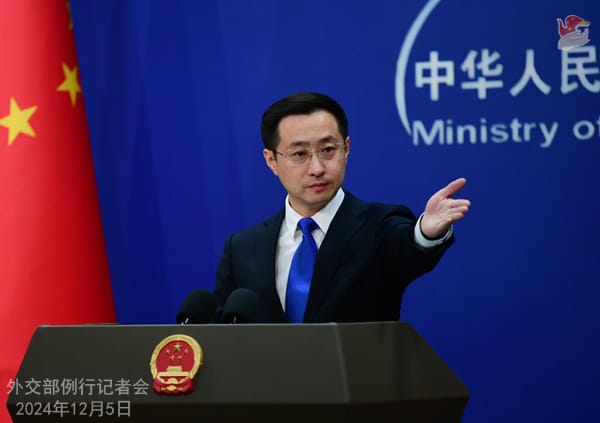

China on Thursday maintained its resolve to oppose the push for the independence of Taiwan.
Beijing cautioned that attempts by foreign powers to sell arms to Taiwan will expose the strait to military danger.
The Asian giant says it is alarmed by attempts by Washington "to assist in the “Taiwan independence” agenda by arming Taiwan."
"This will not shake our firm resolve to oppose “Taiwan independence” and realise national reunification, and will only push Taiwan towards military danger," Lin Jian, a Foreign Affairs ministry spokesperson, said.
In a presser, the spokesperson said the President Xi Jinping administration's stance remains that there is only one China, for which Taiwan is part, and that any attempts to push the independence agenda would be resisted.
"Let me stress that “Taiwan independence” is as incompatible with peace in the Taiwan Strait as fire with water," Lin Jian said.
"China urges the US to abide by the one-China principle and the three China-US joint communiqués, especially the August 17 Communiqué of 1982, act on the US leaders’ commitment of not supporting “Taiwan independence,” he added.
The foreign ministry official said for Beijing, the "US should stop arming Taiwan at once and stop aiding and abetting separatists’ attempts to seek “Taiwan independence” through military buildup."
He stressed that the "Taiwan question is at the core of China’s core interests."
In recent months, the US announced multiple arms sales to China’s Taiwan region.
Jian said the move "gravely violates the one-China principle and the three China-US joint communiqués, interferes in China’s internal affairs, and undermines China’s sovereignty and territorial integrity."
He said that it was for the reason that China imposed sanctions affecting key supply chains inbound the United States.
China says it invoked the Anti-Foreign Sanctions Law of the People’s Republic of China.
China decided to take what it termed as "countermeasures against relevant military companies and senior executives of the US."
For China, the US and any other nation attempting to establish diplomatic ties with Taipei should adhere to the United Nations resolution which entrenched the one-China principle.
The United Nations General Assembly (UNGA) in 1971 passed a resolution (known as Resolution 2758), restoring all rights to the People's Republic of China.
It recognized the PRC as the "sole legal representative of China at the UN".
The outgoing Chinese ambassador to Kenya in May said " the resolution reaffirmed that there is only one China, and Taiwan is a part of it."
He said the UN resolution" clarified that China has a single seat in the UN, rejecting the notions of “two Chinas” or “one China, one Taiwan”."
Zhou added that UN agencies adopted additional resolutions "restoring the PRC's lawful seat and expelling the Taiwanese representatives."
"At the UN, Taiwan is referred to as “Taiwan, Province of China”, Zhou said.
At least 183 countries maintain diplomatic relations with China based on the one-China principle.
Kenya is hailed as "a steadfast supporter of the one-China principle."
Nairobi affirmed the position in a joint Communique between China and Kenya in 2006, and the joint statement by Foreign Ministers of China and Kenya in 2024.
China has over time said it "deeply appreciates Kenya's principled stance", adding that it "compellingly demonstrates that both nations address each other's major concerns and core interests."











